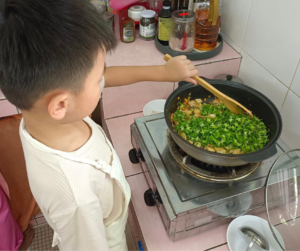Home » Unlocking Culinary Adventures
Teaching kids to cook is a valuable investment in their future. Beyond the practical ability to prepare meals, it offers a wide range of benefits that shape their physical, emotional, and intellectual development.
1. Nutrition Awareness: When kids learn to cook, they gain a deeper understanding of the nutritional value of ingredients. They discover the importance of balanced meals, incorporating essential food groups, and making healthier food choices. This knowledge equips them with the tools to make informed dietary decisions that can positively impact their health throughout their lives.
2. Independence: Cooking empowers children with a sense of self-sufficiency. As they acquire cooking skills, they become less reliant on processed or fast foods. This independence ensures that they can feed themselves nutritious meals even when they leave home for college or work.
3. Math and Science Skills: Cooking is a practical application of math and science concepts. Kids learn to measure ingredients, understand fractions, and observe chemical reactions like leavening agents causing dough to rise. These hands-on experiences enhance their comprehension of these subjects and their practical relevance.
4. Fine Motor Skills: The kitchen is a laboratory for developing fine motor skills and hand-eye coordination. Kids practice dexterity as they handle kitchen tools, chop vegetables, whisk eggs, and manipulate utensils. These skills extend beyond cooking and can benefit them in other areas of their lives.
5. Creativity: Cooking encourages creativity and experimentation. Kids can explore flavors, textures, and combinations, turning ordinary ingredients into unique dishes. This creative outlet allows them to express themselves and develop a sense of culinary artistry.
6. Cultural Appreciation: Cooking offers a window into different cultures and traditions. Trying out recipes from various cuisines exposes kids to diverse flavors and culinary customs. It fosters an appreciation for global cultures and encourages open-mindedness.
7. Bonding and Communication: Cooking together creates opportunities for family bonding and communication. As children and parents collaborate in the kitchen, they share experiences, exchange ideas, and develop teamwork. These moments of togetherness contribute to strong family connections.
8. Confidence Building: Successfully preparing a meal, whether simple or complex, boosts a child’s self-esteem and confidence. The sense of accomplishment that comes from creating something nourishing and delicious is immeasurable. It instills a “can-do” attitude that transcends the kitchen.
9. Time Management: Cooking involves planning and managing time efficiently. Kids learn to organize tasks, prioritize steps, and coordinate various elements of meal preparation. These time management skills have practical applications in many areas of life.
10. Life-Long Skill: Perhaps most importantly, cooking is a life-long skill. It’s not a passing phase but a fundamental ability that will serve children well as they transition into adulthood. The knowledge and experience gained in the kitchen will enable them to lead healthier, more independent lives.
In conclusion, teaching kids to cook is about more than just preparing meals. It’s a holistic approach to education that nurtures their physical health, enhances their cognitive development, and fosters emotional well-being. It equips them with skills and knowledge that will continue to benefit them throughout their lives, ensuring that they are not only well-fed but also well-prepared for the challenges and opportunities that lie ahead.
